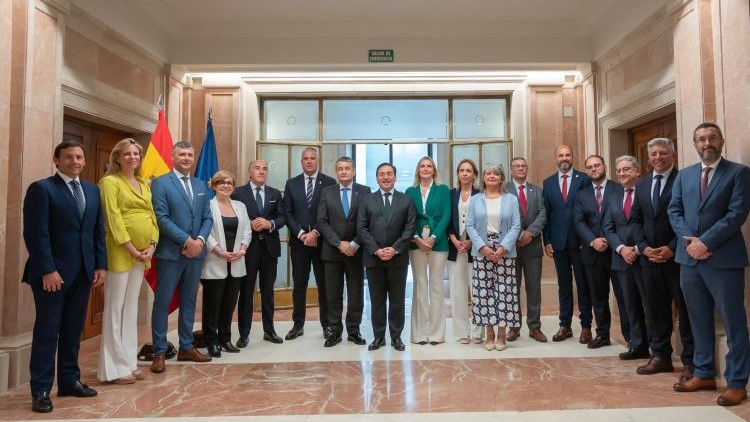Eduardo González
The Minister of Foreign Affairs, José Manuel Albares, will meet again tomorrow with the mayors of Campo de Gibraltar, in this case in Algeciras. The meeting will coincide with a certain cooling of the optimism that had begun to reign between the parties regarding the negotiations on the future fit of Gibraltar in the EU, due to the advance of the British elections and the end of the term in the European Parliament.
The meeting will take place more than three weeks after Albares received on May 13 at the Ministry headquarters in Marqués de Salamanca (Madrid) the representatives of the Junta de Andalucía and the municipalities of Campo de Gibraltar to explain the evolution of the negotiations on the future of Gibraltar in the EU.
During that meeting, both the Junta and the mayors asked him for measures to guarantee economic balance between the two sides of the border, including the granting of their own tax status similar to those of the Canary Islands or Ceuta and Melilla. Likewise, Albares informed them about the progress made after the high-level meeting on April 12 in Brussels between the minister himself, the vice president of the European Commission, Maros Sefcovic – the commissioner in charge of the EU negotiations on the future of Gibraltar after Brexit -, and the British Foreign Minister, David Cameron, in which, he assured, “general political lines that include the airport, goods or mobility, among other issues” were agreed.
Only three days later, the Minister of Foreign Affairs contacted the president of the Junta de Andalucía, Juanma Moreno, and the mayors of Campo de Gibraltar again to inform them of the results of his second meeting in Brussels with Cameron and Sefcovic, held the day before and in which, as indicated in the final joint statement, aspects related to economy, trade, mobility, environment and social well-being were discussed and it was reaffirmed that “the agreement is closer.” In statements to the press in Brussels, Albares assured that same day that the perspective is that “there will be an agreement”, but “there is no possible deadline”, and stressed that “there is no issue in which any of the parties” have shown “a rejection of frontal opposition to reaching an agreement.”
On May 21, the President of the Government, Pedro Sánchez, assured before the Plenary Session of the Congress of Deputies that “intensive work is still being done to guarantee that the freedom of movement of people and goods is done with due guarantees and without any distortion to the internal market,” and expressed confidence that “a comprehensive agreement will be reached during the coming weeks.”
Elections in the two negotiating parties
However, the moderate optimism that reigned over the negotiations between the European Commission and the United Kingdom, with the presence of the Spanish Government, on the future relationship with Gibraltar has begun to cool.
The main reason for this is the decision of the Prime Minister of the United Kingdom, Rishi Sunak, to end the legislature and bring forward the elections to next July 4. The Chief Minister of Gibraltar, Fabian Picardo (who participates in the negotiations within the British delegation), has assured that the process “can continue” because the work of the technical teams is not interrupted and that there could be an agreement before 4 July, but the truth is that, as the observers of the dispute consulted by The Diplomat indicated, the dissolution of the British Parliament is a setback, which is added to the fact that the European Parliament is already dissolved and it will be several months until the that comes out of the June 9 elections.
The same observers estimate that it would be highly criticizable for the current British Government to make such a far-reaching decision now and, in any case, any agreement would not come into force until it was approved by the new Parliaments, both in London and in Strasbourg, the headquarters of the of the European Chamber.







